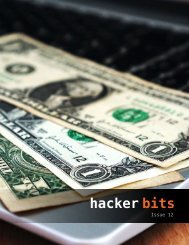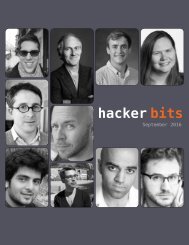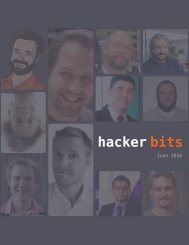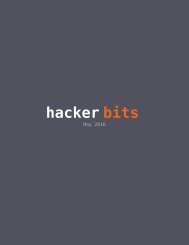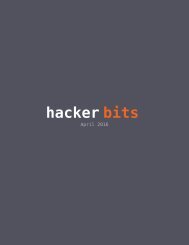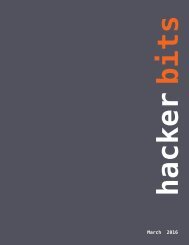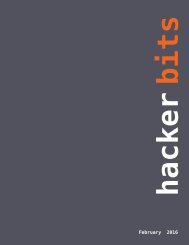Hacker Bits, August 2016
HACKER BITS is the monthly magazine that gives you the hottest technology stories crowdsourced by the readers of Hacker News. We select from the top voted stories and publish them in an easy-to-read magazine format. Get HACKER BITS delivered to your inbox every month! For more, visit https://hackerbits.com/2016-08.
HACKER BITS is the monthly magazine that gives you the hottest technology stories crowdsourced by the readers of Hacker News. We select from the top voted stories and publish them in an easy-to-read magazine format.
Get HACKER BITS delivered to your inbox every month! For more, visit https://hackerbits.com/2016-08.
Create successful ePaper yourself
Turn your PDF publications into a flip-book with our unique Google optimized e-Paper software.
Apple announced that they will be using<br />
a technique called "Differential Privacy"<br />
to improve the privacy of their data<br />
collection practices.<br />
At the <strong>2016</strong> WWDC keynote,<br />
Apple announced<br />
a series of new security<br />
and privacy features, including<br />
one feature that's drawn a bit of<br />
attention and confusion. Specifically,<br />
Apple announced that they<br />
will be using a technique called<br />
"Differential Privacy" (henceforth<br />
referred to as DP) to improve the<br />
privacy of their data collection<br />
practices.<br />
The reaction to this by most<br />
people has been a big "???",<br />
since few people have even<br />
heard of Differential Privacy, let<br />
alone understand what it means.<br />
Unfortunately Apple isn't known<br />
for being terribly open when<br />
it comes to sharing the secret<br />
sauce that drives their platform,<br />
so we'll just have to hope that<br />
at some point they’d decide to<br />
publish more.<br />
What we know so far comes<br />
from Apple's iOS 10 Preview<br />
guide:<br />
Starting with iOS 10, Apple<br />
is using Differential Privacy<br />
technology to help discover<br />
the usage patterns<br />
of a large number of users<br />
without compromising individual<br />
privacy.<br />
To obscure an individual’s<br />
identity, Differential<br />
Privacy adds mathematical<br />
noise to a small sample of<br />
the individual’s usage pattern.<br />
As more people share<br />
the same pattern, general<br />
patterns begin to emerge,<br />
which can inform and enhance<br />
the user experience.<br />
In iOS 10, this technology<br />
will help improve Quick-<br />
Type and emoji suggestions,<br />
Spotlight deep link<br />
suggestions and Lookup<br />
Hints in Notes.<br />
To make a long story short,<br />
it sounds like Apple is going to<br />
be collecting a lot more data<br />
from your phone. They're mainly<br />
doing this to make their services<br />
better, and not to collect individual<br />
users' usage habits.<br />
To guarantee this, Apple<br />
intends to apply sophisticated<br />
statistical techniques to ensure<br />
that this aggregate data the<br />
statistical functions it computes<br />
over all your information —<br />
don't leak your individual contributions.<br />
In principle this sounds<br />
pretty good. But of course, the<br />
devil is always in the details.<br />
While we don't have those<br />
details, this seems like a good<br />
time to at least talk a bit about<br />
what Differential Privacy is, how<br />
it can be achieved, and what it<br />
could mean for Apple and for<br />
your iPhone.<br />
The motivation<br />
In the past several years, "average<br />
people" have gotten used to<br />
the idea that they're sending a<br />
hell of a lot of personal information<br />
to the various services they<br />
use. Surveys also tell us they're<br />
starting to feel uncomfortable<br />
about it.<br />
This discomfort makes sense<br />
when you think about companies<br />
using our personal data to<br />
market to us.<br />
But sometimes there are<br />
decent motivations for collecting<br />
usage information. For<br />
example, Microsoft recently<br />
announced a tool that can<br />
diagnose pancreatic cancer by<br />
monitoring your Bing queries.<br />
Google famously runs Google<br />
Flu Trends. And of course, we all<br />
benefit from crowdsourced data<br />
that improves the quality of the<br />
services we use — from mapping<br />
applications to restaurant<br />
reviews.<br />
Unfortunately, even<br />
well-meaning data collection can<br />
go bad. For example, in the late<br />
2000s, Netflix ran a competition<br />
to develop a better film recommendation<br />
algorithm. To drive<br />
the competition, they released<br />
hacker bits<br />
7





